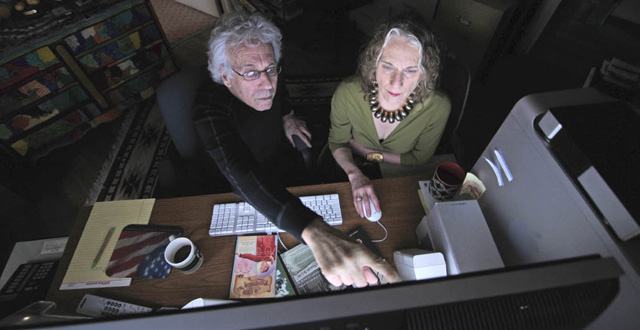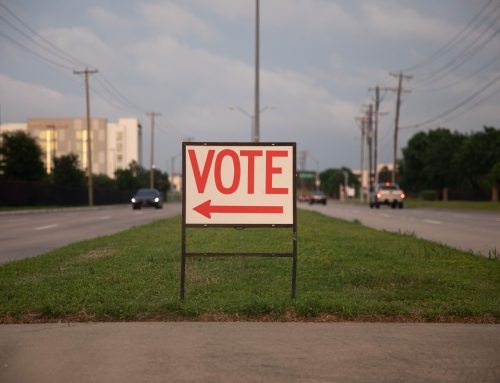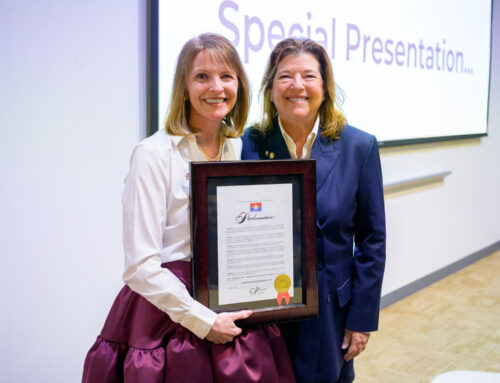The Mondells moved to East Dallas in the 70s. Coming from similar backgrounds — Allen’s in reporting and Cynthia’s in public information — they soon began collaborating on projects. Now they’ve been married for 43 years and working together for 35. Decide for yourself whether or not that’s a good thing.
How did y’all come to be in East Dallas?
AM: “I got a job at KERA, so we arrived here in 1973, and I went to work for a program at the time called Newsroom. We came here from Vermont. I was writing the ‘As Yet Unpublished Great American Novel,’ and she was writing the ‘As Yet Unproduced Great American Screenplay,’ but we’re not independently wealthy, so we were running out of money. So we applied around, and we tried different places around the country to get jobs, and wherever we got the job that’s where we would go. So KERA gave me an offer, and we came here, and we liked it. Do you want to pick up from here?”
CM: “We liked the area because it was diversified, and we only had a bicycle, so it was easy to get around.”
AM: “No, the question now is…”
CM: “The question was ‘How did y’all come to be in East Dallas?’”
AM: “Well, we’ve gotten beyond that.”
CM: “Oh, well, I don’t listen to what he says.” *both laugh*
AM: “This goes on all the time. We’ve been married for 43 years, and we’ve been working together for 35 years.”
CM: “And I still don’t listen to what he says. So anyways, we liked the area because it was diversified, and the little shops around here were really cool. Since we couldn’t find our mountains and our vistas, then we wanted a strong community, and that’s why we chose this area.”
When did the two of you start working together?
CM: “We started working together when I raised money for a film named ‘Who Remembers Mama?’ in 1977. I raised money for the film, and KERA was going to give me the matching in-kind services, and one of the matching in-kind services was Allen was going to produce it for KERA.”
AM: “I never thought of myself as an in-kind service.” *both laugh*
CM: “You’re an in-kind service. You and the Xerox machine. So, anyways, we really worked well together. I had renovated an office, and then Allen decided it would be good to leave KERA and work with me.”
So what is it like to work with your spouse?
AM: “We both felt like we wanted to make films that somehow could make changes in people’s lives, could make a better society, and we felt like together we would make these films that hopefully would make a difference. We would also distribute them, rather than handing it off to a distribution company. So by producing and distributing, we could make sure the films could get to the people and the organizations that could benefit from the subject matter.
“We have similar skills, so it’s not like she’s doing all one thing, and I’m doing all of the other. We both co-write, co-produce and co-direct the films that we do. Cynthia is better at one thing. Because of her background and her personality, she’s much better at marketing and PR than me. See, that’s a pitch to you.”
CM: “I thought you were going to say technology.”
AM: “That too.”
CM: “The technical part, I’m much more astute…”
AM: “More astute. Not much more astute.”
CM: “But in terms of the content, we both have very different eyes in the way we see certain things and the way we interpret. So what makes our collaboration really successful is that there’s no ego involved. It’s just the project that we care about. It’s the importance of the film, and we also respect each other’s opinion. We don’t agree a lot, but we respect each other. When we first started, when we were working on different projects, we thought the project we were working on was the most important thing in our lives, and we would neglect things at home. It’s easier to split those things up when you know the other person is working just as hard as you. There’s an understanding.”
Would you say that’s the key, having a common goal?
CM: “Oh yeah. I’ve seen a lot of people who work together, when one of them gets more credit than the other, that splits up their collaboration.”
AM: “It’s a partnership. And in a partnership, whether it’s in a totally different business or whether it’s a relationship, you have to have respect for each other.”
Learn more about the Mondells’ Media Projects, Inc. at mediaprojects.org. The couple’s most-recent film, “A Reason to Live” aired on KERA in January.






